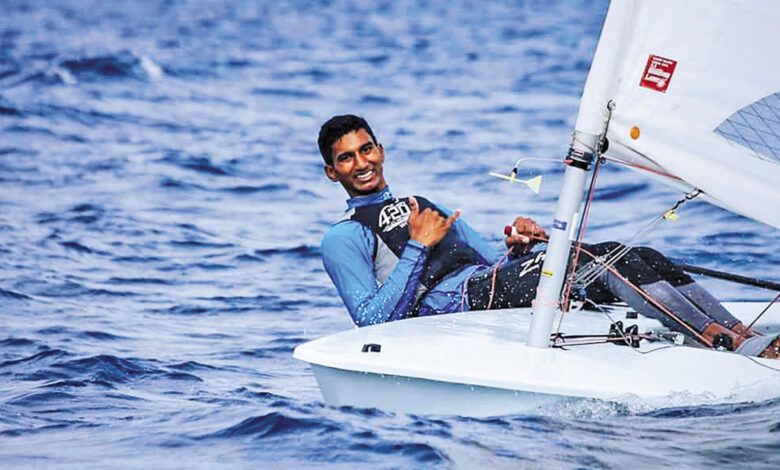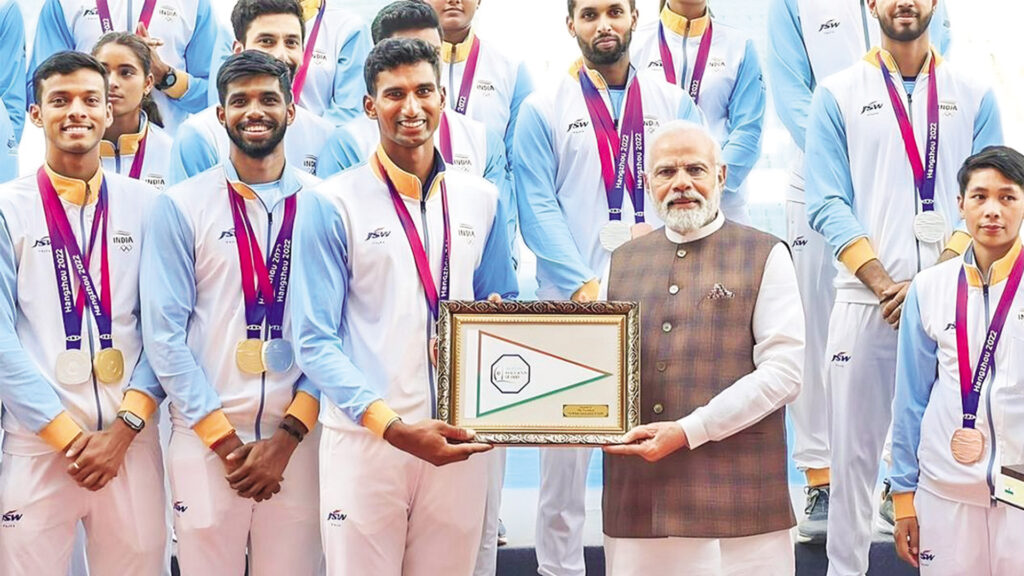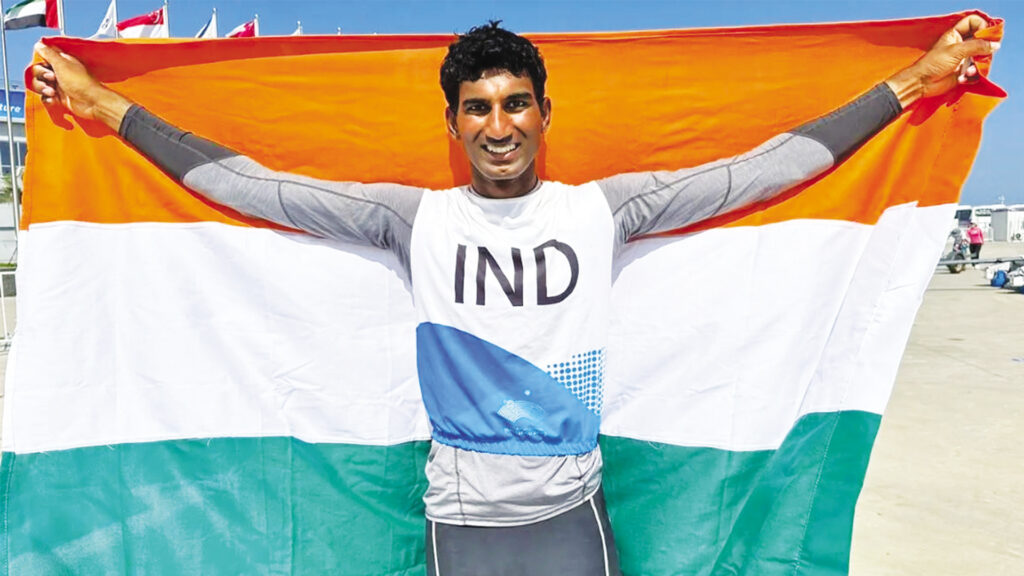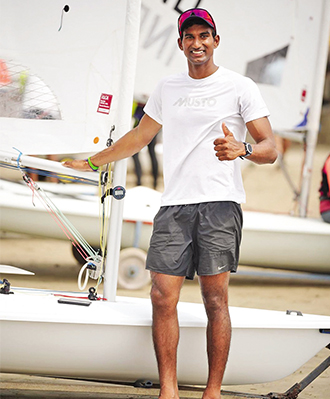Rising Tides

One of India’s best Laser Class sailors Vishnu Sarvanan from Mumbai sets sails to Olympics, 2024 after winning a bronze medal at the Asian Games in 2023. He gets candid with Priyanka Chandani on preparing for the summer games, challenges at sea and all things sailing
It is perhaps the best time for Indian sport. Whether it is much loved cricket, or other mainstream games and less ventured games like sailing and javelin, it’s raining medals at most of the world championships, including the Asian Games. Adding to the winning spree is Mumbai-based sailor Vishnu Sarvanan who fetched a bronze medal in men’s ICLA7 also known as Laser Standard at the NBX Sailing Centre in Ningbo in China.
Still training in Europe, Vishnu caught up with us over a call for a brief conversation about his selection into the Olympics, which he says was his dream post winning a medal at the Asian Games last year. “I am very happy to secure my spot in the Olympics. I failed to win last time in 2021, but this time I am trying my best to win a medal for the country. I want to win the Olympic medal because no Indian sailor has won that before,” says Vishnu.
Full sails ahead
While National Olympic Committees (NOCs) typically have exclusive authority over their country’s representation at the Olympic Games, athletes’ participation in Paris depends on their NOC’s selection for the delegation. Nevertheless, being a top contender in Laser class category in India, Sarvanan has undergone rigorous qualifying rounds.

His journey to qualification involved competing in the ILCA 7 Men’s World Championship 2024 in Adelaide, Australia. Out of a field of 152 participants, Sarvanan finished 26th, placing fifth among sailors eligible to secure quotas for the Paris Olympics, with only seven spots available.
India’s confirmed participation in sailing at the Summer Games fills me with pride, and at the same time, I feel determined to train rigorously and win the medal that I couldn’t do last time. Although, medal is just part of the process. It’s a gift you get after following the process very diligently. I enjoy the process because the medal will go on the wall and sit there. But the process will always remain in my heart. I enjoy the routine of getting up early, working out, going to sea for training and preparing my tactics for the championship,” says the sailor.
Mumbai to Malta
If all goes well, Sarvanan will join the esteemed ranks as only the second Indian sailor to represent India in multiple Olympic Games, following in the footsteps of Farokh Tarapore, who competed in the Los Angeles 1984, Seoul 1988, and the Barcelona 1992 Summer Olympics. Sarvanan’s expertise lies in the men’s one-person dinghy, specifically the Laser Standard (ILCA 7) category, within the International Laser Class Association (ILCA) sailing class. The Laser Standard is a nimble, singlemasted vessel, perfectly made for the challenges of competitive sailing.

Sarvanan’s journey to the Olympics hasn’t been easy. To start with Sarvanan missed a medal at the 2018 Asian Games. “It was because of my own mistakes. I felt really bad and cried at that time. That became my motivation to participate in the Olympics and Asian Games,” says the sailor, who went to Europe for training. He says, initially, his father sponsored his training to Europe, later, seeing his potential Indian Army, Ministry of Sports and Sailing Federation of India extended their support. Earlier, in 2021, Vishnu along with three other sailors secured spot in the Olympics. However, none of them fetched any medal. “My goal after winning the World Championship was to get India’s spot in sailing at the Olympics. And the qualifying race in Oman that year was the most difficult race I have ever participated in. I stood first and qualified for the Olympics. After that, my target was the Asian Games this year. I was back in the game. I was hoping for Gold but the last (medal) race didn’t happen due to no winds and I got Bronze. I didn’t check the result until the medal race because I was just enjoying being at sea sailing in China. Just being in the moment was the most important thing for me,” he says.
Plotting course
Following his ideal Kobe Bryant’s advice, ‘you need to learn your opponents’ weaknesses, and strengths, and need to know when to use it and when not’, Sarvanan studies his competitors’ strengths and weaknesses before he competes against them. “Of course, when you are back on the land, you forget everything and are not competitive. Once I am at sea, I am hungry for the win and I have to go for the kill. I know their weaknesses and strengths that I put to use to my own advantage. But sometimes, that also works against you. During the Asian Games race, I got two penalties for some tactical mistakes, but I made up. For a good sailor, you have to sail in all conditions. You can’t withdraw,” says the Asian Games winner.
Charting the milestones
At the age of 17, Sarvanan was selected as a cadet by the Madras Engineers Group (MEG) Boys Sports Company in 2015, marking the beginning of his journey toward professional sailing. Despite the opportunities given to him, he faced challenges due to the influence of individuals with greater power and authority. “I had to go the extra mile to prove myself, as neither my father nor anyone close to me had any contacts with decision-makers. Nothing disheartened me, I felt content and west right to my dream with determination, and that paid off,” he shares.
Focusing on the winds

While it’s been over a decade for Sarvanan to sail at seas, there are some challenges that he finds difficult to concur. “Focus is the most difficult thing in sailing. You can’t really keep your focus on one thing for a really long time but in sailing, I am focusing on three things together – winds, boat speed, and the technical part of sailing. As a sailor, I have to anticipate and think ahead. I have to have an eagle eye view. It puts a lot of stress on your mind and body. I can feel my feet and legs burning and my mind keeps telling me to stop but I have to fight that all. Then there’s the opponent, who you see is getting more wind than you so maybe you change your route. There’s a constant fight to change the tactics and protect yourself. Sailing is like chess on water because you are always playing from the other’s side as well,” he explains. Has this process evolved you as an individual? “Yes, a lot! In a very positive way. It teaches you what life really means and how you can’t control everything. You only have to worry about things that you can control and the storms will get over and at some point, there will be sunshine. You have to look for the brighter side and find calm.”
The government needs to extend support with basic equipment and coaching. I feel the state government needs to spend some money on sailing equipment for local schools.
Making sports mainstream
Although Sarvanan has started sailing at a very young age, sailing wasn’t the first career choice. It was after seeing his father windsurfing and participating in various sports that drew him to sailing. “I was very close to choosing football, but my father told me that it is a team sport and it is difficult. At that time, football wasn’t so popular and supported in India and it’s still difficult to excel in that game. So sailing took priority,” says the sailor. When asked his idea of making sailing a mainstream sport he says winning global competitions will bring spotlight to the lesserknown sports. “All the people in the game have to win big championships and bring medals to India so that people know about sailing. I feel the state government needs to spend some money on sailing equipment for local schools. Take students at sea and introduce the sport. Sailing should be part of school education. The sport needs to be in children’s and parents’ knowledge. It’s also a great way to teach children life values,” he says in conclusion.

